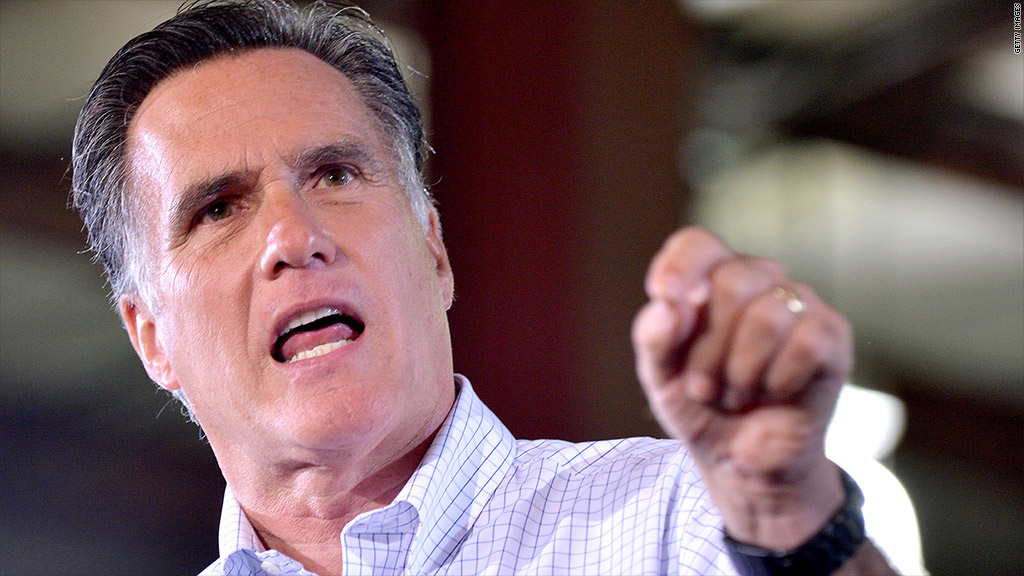
The campaign for presumed Republican presidential nominee Mitt Romney released a plan Thursday for North America to be energy independent by 2020.
Touting the country's newly accessible oil and gas reserves, Romney touched on familiar themes he said would wean the country off imported oil and spark an economic boom at home. Namely, fewer federal regulations, less support for renewable energy, and more oil drilling.
"We're not going to have to buy oil from the Middle East, Venezuela, or any other place we don't want to," the candidate said at a campaign stop in New Mexico. "We may even be an exporter of energy, considering all our resources."
Specifically, he called for:
-- States to have control over drilling on federal land within their borders.
-- Placing oversight of all onshore energy developments withing the hands of the states.
-- Opening of new offshore areas, starting with blocks off the coasts of Virginia and the Carolinas.
-- Approval of the Keystone pipeline.
-- Set minimum oil production targets in the government's leasing plans.
-- Start a fast track approval process for various energy projects, including nuclear.
-- Limiting the ability of environmental groups and others to file lawsuits.
Romney acknowledged that conventional sources of oil are dwindling, but said the new production would come from places like the deepwater Gulf of Mexico, Canada's oil sands and shale formations.
In a position paper on the matter, Romney laid out a list of benefits that he said would come from obtaining energy independence, including the creation of 3 million new jobs, $1 trillion in government revenues, a stronger dollar and lower energy prices.
But a recent report from the nonpartisan Congressional Budget Office, requested by Romney's running mate Paul Ryan, was less sanguine.
CBO said 70% of the nation's oil and gas reserves are already available for drilling. Opening the rest, it said, would increase government receipts from an estimated $150 billion under current policy to $175 to $200 billion over the next 10 years.
Related: Iraq oil production surpasses Iran
When asked to explain the difference, a Romney staffer said the campaign's projections were more inclusive and stretched out over a longer time period.
The United States is in the midst of an energy boom, largely thanks to new technology for extracting energy from shale. Some analysts say it is possible that North America will not need to import any oil in a decade or so. That's partly due to the energy boom but also because of higher fuel economy standards.
Those same analysts also caution that, while more oil on world markets is generally a good thing, prices would still be tied to the global market and subject the same forces that currently cause spikes.
The energy boom in the United States is also not without controversy. The new shale fields require hydraulic fracturing, or fracking for short. That process involves cracking the rock with pressurized water, sand and chemicals. Critics fear it is contaminating the ground water.
While Romney and other Republicans criticize Obama for investing too much in renewables and holding up fossil fuel development, the record is more mixed.
Obama has touted the energy boom himself. He's done little to restrict fracking, opened up new areas for drilling in the Gulf of Mexico and indicated he'll issue permits to drill in the Arctic.
But the administration has also increased the environmental and safety standards for fracking, offshore drilling, and tightened emissions rules on power plants. The current administration has also issued fewer permits for drilling than George W. Bush, largely due to the moratorium imposed after the BP spill in 2010.
Related: America's energy boom, at a cost
Romney criticized Obama's support for renewable energy subsidies, and highlighted companies that have received government funding and then gone bankrupt like Solyndra and Ener1.
The administration has repeatedly defended its decision to invest in renewable energy companies. It notes that most of the companies it funded under stimulus programs are still going concerns, and that energy from wind and solar projects have doubled on the administration's watch.
"The Republican approach is essentially one that is written by or dictated by big oil and it focuses almost entirely on oil and fossil fuels," White House Press Secretary Jay Carney said in response to Romney's plan.
Romney didn't specifically call for an end to subsides for wind and solar in Thursday's report, but instead called for the government to stop "distorting the playing field." He said the government should support advanced energy development at the basic research level, not at the commercialization phase.
He has previously said he would not support extending the federal subsidy for wind power, which expires at the end of the year.


